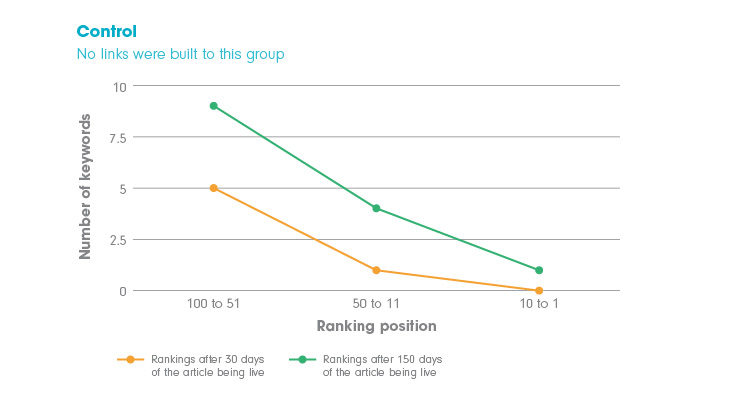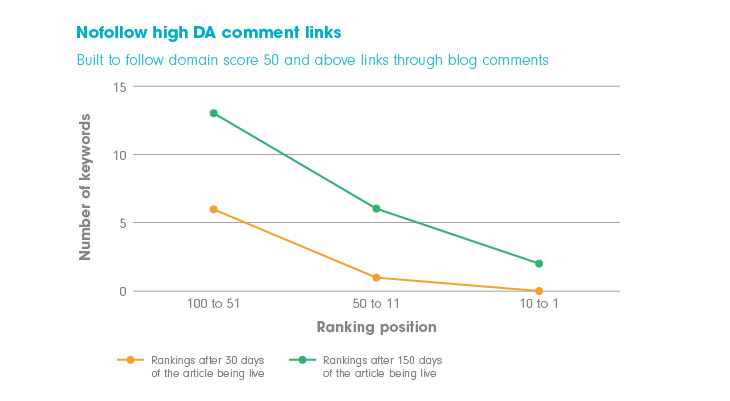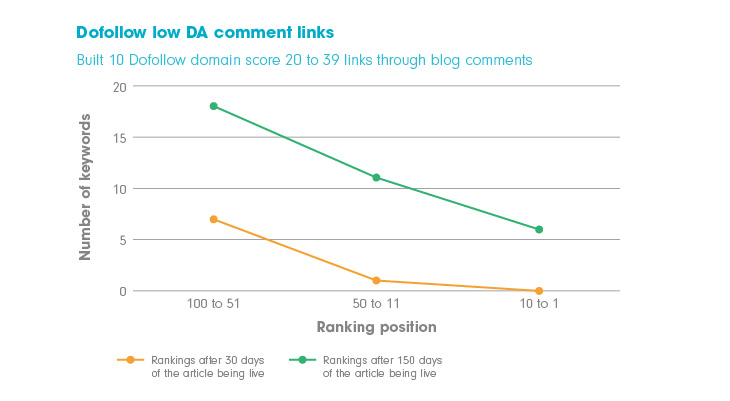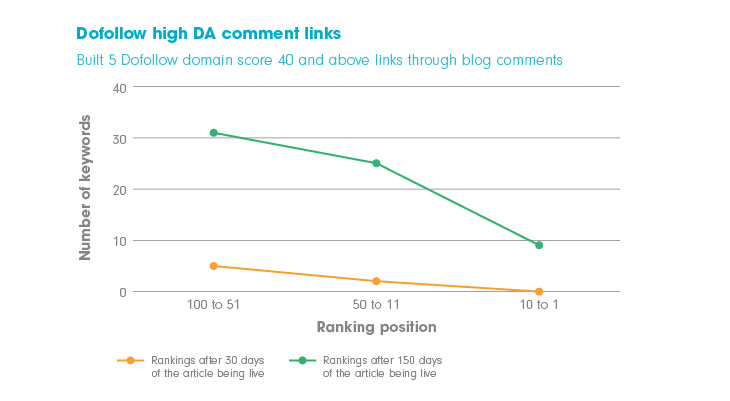Digital Marketing | 10 min. read
Building backlinks from blog comments – will it help with SEO?
Written by Nik Stapleton, 04.05.2022

Building backlinks from blog comments – will it help with SEO?
We’ve all seen them on our favourite blogs. Some add value and reward users for hopping across to another brand’s content. But the majority are just spam, and do anything but offer value. So why do so many people invest time and resource into littering links to their content in the comment sections of other peoples’ blogs?
Simple, it’s because building backlinks from blog comments is perceived by many to be an easy link building tactic. And we know how important link building is for SEO. But, with many blogs now adding the ‘nofollow’ attribute to their comments [which prevents Google from following the link and driving any SEO value to the URL in the link when they crawl the page], the jury’s out on how effective this tactic really is.
Are marketers that implement this tactic wasting their time? Or are they being shrewd?
Thankfully, we have an answer, or at least an indication, thanks to a seven-month-long test conducted by Neil Patel – an eminent digital marketing entrepreneur and prolific digital tactic ‘tester’.
In one of his latest marketing experiments, Patel attempted to determine whether building backlinks from blog comments helps improve search engine rankings. To test this, Patel had 183 low authority site owners produce quality content [1,800 to 2,000-word blog posts] on a subject relevant to their site. He then waited 30 days and analysed test subject rankings using Ubersuggest to benchmark for the test. Rankings were measured by analysing how many keywords each participant’s URL ranked for in the top 100 spots, top 50, spots, and top 10 spots.
Aside from a control group, Patel then instructed the site owners to build backlinks in the comments of blogs that met specific criteria [more on this below]. After three months Patel used Ubersuggest again to compare how site rankings changed after owners had built backlinks in blog comments.
[For more details on the test method and results, take a look at Patel’s write-up]
Patel’s findings in a nutshell:
Patel’s test concluded that backlinks created in [3rd party] blog comments do provide an SEO advantage, regardless of whether they’re ‘dofollow’, ‘nofollow’ or on high or low domain authority websites [blogs]. However, certain types of backlinks were more effective at doing so than others. Through his experiment, this is what he found:
‘Nofollow’ comment links on High Domain Authority sites:
Building backlinks through comments on websites of this type produced better results than the control group even though the links were ‘nofollowed’; but not by a substantial amount. [Bear in mind, this could be the result of other factors [such as content quality and keyword difficulty] that weren’t controlled during this particular test].
The effect they had on improving rankings was minimal. This can be seen when comparing results with the control group.


‘Dofollow’ comment links on Low Domain Authority sites:
Building backlinks from blog comments on sites with ‘dofollow’ links but low domain authority will improve rankings more than building ‘nofollow’ links [even if they’re on blogs with high domain authority]. However, they are nowhere near as effective at improving rankings than ‘dofollow’ links in the comments of blogs on sites with high domain authority.
Patel’s test proved this, as he instructed the test group that were building backlinks from blog comments with ‘dofollow’ links on sites with low domain authority to build twice as many [10] as those building backlinks from blog comments with ‘dofollow’ links on sites with high domain authority [5]. The results concluded that link quantity wasn’t as important a factor as domain authority when using this tactic to improve rankings.
The ‘dofollow’ links on low domain authority sites helped the test group increase their rankings by 337%, but the group building fewer ‘dofollow’ links on high domain authority sites were able to increase their rankings by 828% [even though they had half the backlinks].

‘Dofollow’ comment links on High Domain Authority sites:
Comment links from high authority sites improve rankings more than comment links on any other type of comment link on high or low domain authority sites. In short, if you’re going to start building backlinks from blog comments, these are the type you want to build.

So, do backlinks from blog comments actually help rankings?
Yes.
Patel’s test proves it – building links through blog comments helps rankings. Subject to the content at the other end of the link being good quality and the comments left providing value and not being ‘spammy’ [i.e. containing at least 75 words, and providing value to users].
How to build backlinks from blog comments efficiently:
When implementing this link building tactic prioritise commenting on blogs that have high domain authority and ‘dofollow’ links. If you have limited time and resource to implement this link building tactic, spend it on leaving a few considered comments that provide value to readers of content on high authority blogs with ‘dofollow’ links.
After this, focus on low domain authority blogs with ‘dofollow’ links. You’ll improve your rankings, but will need to invest more time and resource into commenting in higher frequency to match the results that building backlinks in the comments of high authority blogs with ‘dofollow’ links. To maximise the effectiveness of this tactic, you need to invest time in building both types of backlink.
Don’t completely discount building ‘nofollow’ links on high domain authority blogs. Though they make no significant impact on ranking, they present an opportunity to drive relevant traffic from a site that likely has considerably more traffic than your own. If your blog is packed with quality content, and its design [UX] encourages users to interact with multiple pieces of content when they visit, this could also support your SEO by improving key engagement indicators [such as reducing bounce rate and increasing dwell time].
Remember, this link building tactic shouldn’t be used in isolation. Yes, it will generate better results than performing no link building at all, but for the best results, you need to positively influence all of the on-page and off-page SEO factors you can.
Building backlinks from blog comments isn’t the only way to improve rankings
Outside of making sure all on-page SEO factors are optimised, there are a number of off-page SEO factors [outside of link building] you need to influence if you want to improve how well your website ranks. You need to address link related factors by building quality backlinks, and non-link related factors – like social signals, online reviews, brand mentions, citations and [for ranking on Google specifically] Google My Business.
However, that’s not to say building backlinks from blog comments or any other type of link building is necessary to improve search ranking. Provided content is high quality, and on-page SEO factors are optimised, you’ll naturally grow your search rankings even if you don’t build any links. Still, not growing your link count will limit the number of [relevant] keywords your website content ranks highly for – likely limiting you to long-tail terms that aren’t too competitive – which in itself isn’t necessarily a bad thing [particularly not in niche markets].
FAQ for building backlinks from blog comments
Can I build backlinks from comments on any old blog?
No.
Your link building efforts need to be focussed on relevant blogs. Why? Because if you’re shoehorning links to your business’s website into the comments of an unrelated blog, you’re going to become one of those annoying spammers – not good for conversion or your brand reputation.
Your time is better spent implementing this tactic properly; not least because there’s a chance users heading to your site via links on related blogs converting into a marketing and sales qualified leads.
How do I find blogs that have ‘dofollow’ comments?
For obvious reasons, if you are going to use this tactic to support your SEO, you’ll want to focus on efforts on blogs that have ‘dofollow’ comments. So, before you can start, you need to identify which blogs will reward you the most for leaving a link in their comments section.
Finding blogs that have ‘dofollow’ comments isn’t difficult. You can pinpoint them using Google. Perform a Google search for the following:
“title=”CommentLuv Enabled”” [plus your keyphrase] – this will showcase blogs that have CommentLuv enabled [which means they pass link juice] that are relevant to you.
“Dofollow blogs [plus your keyphrase] ” – Someone will likely have already done the heavy lifting for you. Perform this search, and you’re likely to come across several blog articles listing blogs in your space [or a relevant related space] that have’ dofollow’ links. But be careful, make sure you double-check each site as many blogs on these lists have ‘nofollow’ comments despite bloggers claiming they are ‘dofollow’. Do your due diligence to make sure you’re not wasting your time.
You can also use Followlist – a directory of blogs that have ‘dofollow’ links.
Important things to remember when building backlinks from blog comments to increase search engine rankings
- When building backlinks from comments, focus on blogs with higher domain authority as it has a much bigger impact on rankings.
- Only leave comments on relevant blogs – even if that means you’re limited to building backlinks in the comments of low authority sites. Don’t be a spammer!
- Make sure your comments add value to the blog’s readers. Don’t over optimise your copy [i.e. get caught up with cramming in the perfect anchor text], spend your time producing quality comments that will get through spam filters, encourage users to click and help to reinforce your brand positioning [if you do it well!].
- For the best results, don’t use this link building tactic in isolation. Your content distribution process should include several steps that will help you build quality backlinks and improve your search rankings. You also need to influence other off-page SEO factors if you really want to climb the SERPs.
Should marketers spend time building backlinks from blog comments if they want to improve their site rankings?
If you’re thorough and keen to do everything in your power to propel your website up Google’s results pages, you need to make sure all effective link building tactics feature in your content distribution process.
It would be criminal not to implement this tactic – even on a small scale – given the compelling conclusions drawn from Patel’s test. If you’re serious about improving your search engine visibility, you can’t afford to omit link building from your tactical marketing plan; it’s a critical part of off-page SEO. But you need to make sure you’re performing it efficiently.
Your goal should be to create as many links from as many authoritative linking domains as you can, in as efficient a way possible.
There are many white hat link building tactics you can use to do this. As well as building backlinks in blog comments, you can leverage tactics like guest posting, testimonial writing, contributor outreach and high-quality infographic/ content creation. But, unfortunately, marketers often find themselves without the resource to implement them all.
You know what time and resource you’re able to commit to link building and other off-page SEO activities. There’s no point having an activity in your marketing plan if its implementation is unrealistic. Before ploughing all of your efforts into, see which tactics work best for you and your business. Do your own testing – marketing is about measurement and optimisation after all. Determine which tactics you’re realistically able to implement and measure which are yielding the best results. That way, over time, you’ll be able to refine your plan and remove inefficiency from your processes.
Need help improving your business’s search engine rankings?
When you want to increase your business’s visibility on search engines, having a good marketing agency in your corner can make all the difference.
Whether you need help determining which link building tactics will be most effective for your business and implementing them, or producing the quality content necessary for off-page SEO, talk to Intermedia.
Originally published May 4, 2022 16:39pm, updated April 19, 2023
